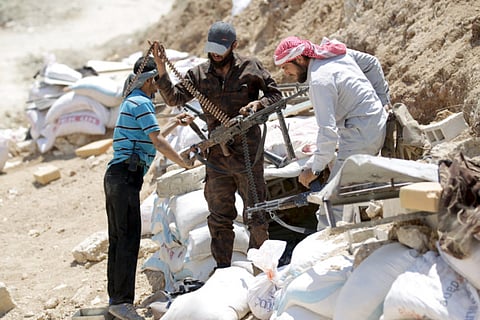Syrian rebel advances put Al Assad under pressure
Unconfirmed reports emerge of more than 20,000 Iraqi, Iranian and Lebanese fighters entering Idlib

Beirut: Steady advances by rebels on key fronts in Syria mean President Bashar Al Assad is under more military pressure than at any point in the four-year war.
Losses in the north, east and south to groups including Al Qaida’s Syrian arm and Daesh may test Al Assad’s hold over western parts of the country that are the most crucial to his survival.
After his loss of Palmyra, a symbolic and militarily strategic city, and nearly all of Idlib province, he appears to be circling his wagons more closely to a western region that includes Damascus, Homs, Hama and the coast.
Sources familiar with the thinking in Damascus acknowledge that pressure is growing, but say the government is confident the army can defend crucial territory with the help of its allies.
Al Assad still controls areas in more far-flung parts of Syria, but these are dwindling in number. His decision to maintain forces in places such as in Deir Al Zor, Hasaka and Aleppo suggests he still wants to preserve a nationwide presence, rejecting Syria’s de facto partition.
Extra support
Sources familiar with the government’s thinking say Al Assad is confident about standing his ground: extra support is expected from Iran, his strongest ally, which said on Tuesday it would continue to stand by Syria. The Lebanese militant group Hezbollah, which is backed by Iran, is more widely deployed in Syria than ever.
And Al Assad still believes the West will eventually rehabilitate him as a partner in the fight against Daesh — a shift that shows no sign of happening, but one he thinks is inevitable given the risk of a full extremist takeover.
“The summer will be tough on the ground, but red lines will not be breached,” said one source familiar with the thinking in Damascus, declining to be named because he was discussing private conversations with Syrian officials.
Al Assad has survived such pressure before, notably at the end of 2012 when the West thought his government was near collapse.
But the difference now is that the rebels have grown in strength while government forces have been weakened after more than four years of fighting.
Al Assad has also lost Iraqi Shiite militiamen who had been fighting alongside Syrian forces. They went home to fight Daesh after it captured Mosul and other Iraqi cities last June. The sudden advances also added to the military pressures facing Iran both in Syria and Iraq.
Dynamic
Rebel groups in the north and south of Syria have emerged as the war’s most dynamic force in the past two months.
They are better organised and armed than before and are believed to have received new support from Al Assad’s regional enemies.
“Clearly the trends right now are working against the regime, but it appears the regime’s backers — and Iran in particular — may increase their support in an attempt to reverse those trends,” said Noah Bonsey, senior analyst with the International Crisis Group think tank.
“It is too early to tell what such an escalation could achieve,” he said. “The regime is still seeking to maintain as much of its geographic reach as it can.” Lebanon’s Al Safir newspaper on Tuesday said more than 20,000 Iraqi, Iranian and Lebanese fighters had entered Idlib province in readiness for a counter attack.
Public concern about the war has surfaced in government-held areas where most of the population still lives. The Syrian lira has weakened.
Foreign Minister Walid Al Mu’allem fielded tough questions during a televised news conference in Damascus last week, including whether Syria was now in fact partitioned.
One journalist put it to him that Iranian and Russian statements of support were failing to halt rebel advances.
People were asking why this support was not more apparent on the ground, the journalist said.
“This question is certainly asked in the popular opinion,” Mu’allem said. The relationship with Russia and Iran “is deeper than some think”, he added.
A diplomat who tracks Syria said the tone reflected a new government willingness to admit vulnerability.
“It’s a change in their attitude,” the diplomat said. “The general mood is black.” The deputy head of Israel’s armed forces said this week the Syrian military had “ceased to exist, de facto”, while Hezbollah was investing in thousands of its fighters in Syria.
Sign up for the Daily Briefing
Get the latest news and updates straight to your inbox


